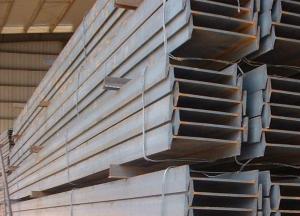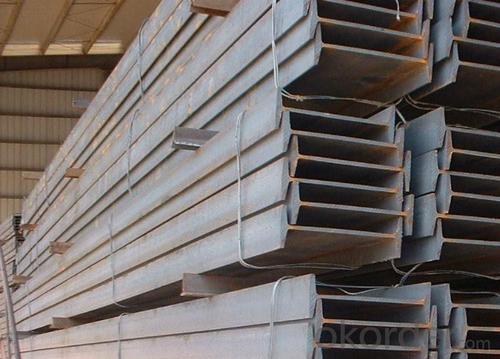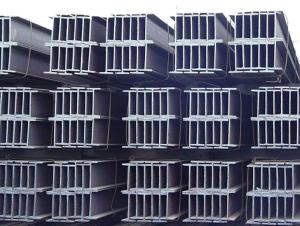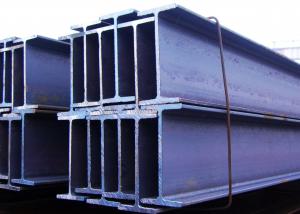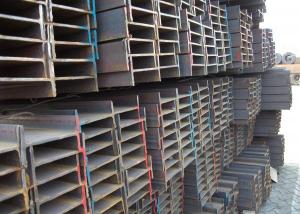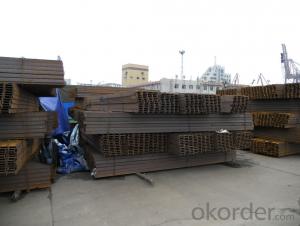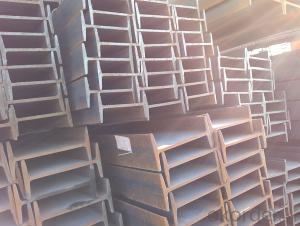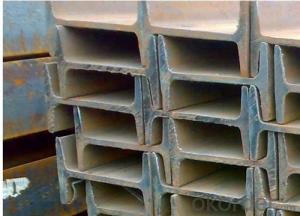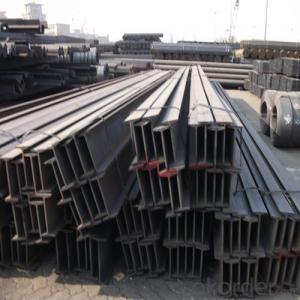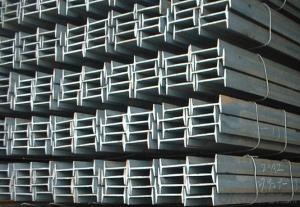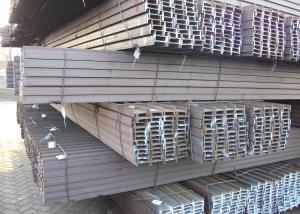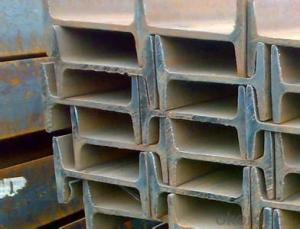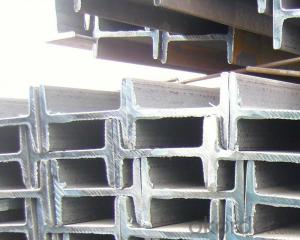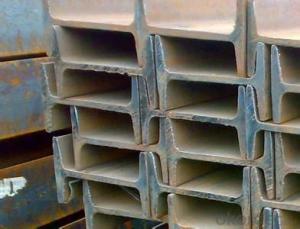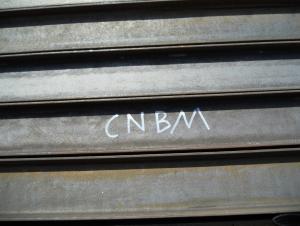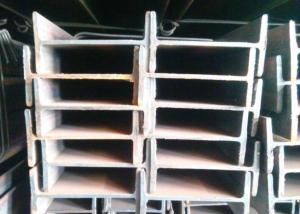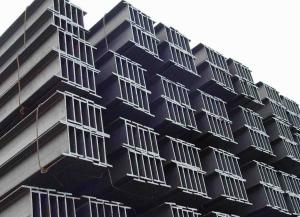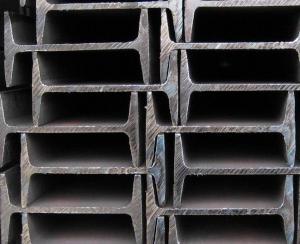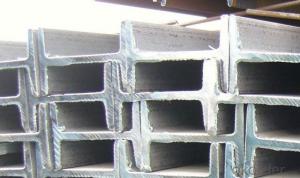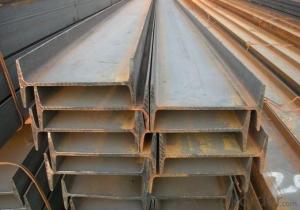High Quality Steel I Beam
- Loading Port:
- Tianjin Port, China
- Payment Terms:
- TT or LC
- Min Order Qty:
- 15MT m.t.
- Supply Capability:
- 10000MT m.t./month
OKorder Service Pledge
OKorder Financial Service
You Might Also Like
Specifications of High Quality Steel I Beam
Standard: EN10025, ASTM, GB Standard, DIN, JIS, etc.
Material of High Quality Steel I Beam:Q235, SS400, A36, S235JR, S275JR, etc
|
Alloy No. |
Grade |
C |
Mn |
S |
P |
Si |
|
Q235 |
B |
0.12%-0.20% |
0.3%-0.7% |
<=0.045% |
<=0.045% |
<=0.3% |
Sizes: 80MM-270MM
|
Section |
Standard Sectional Dimensions(mm) | ||||
|
|
h |
b |
s |
t |
Mass Kg/m |
|
IPE80 |
80 |
46 |
3.80 |
5.20 |
6.00 |
|
IPE100 |
100 |
55 |
4.10 |
5.70 |
8.10 |
|
IPE120 |
120 |
64 |
4.80 |
6.30 |
10.40 |
|
IPE140 |
140 |
73 |
4.70 |
6.90 |
12.90 |
|
IPE160 |
160 |
82 |
5.00 |
7.40 |
15.80 |
|
IPE180 |
180 |
91 |
5.30 |
8.00 |
18.80 |
|
IPE200 |
200 |
100 |
5.60 |
8.50 |
22.40 |
|
IPE220 |
220 |
110 |
5.90 |
9.20 |
26.20 |
|
IPE240 |
240 |
120 |
6.20 |
9.80 |
30.70 |
|
IPE270 |
270 |
135 |
6.60 |
10.20 |
36.10 |
|
IPEAA80 |
80 |
46 |
3.20 |
4.20 |
4.95 |
|
IPEAA100 |
100 |
55 |
3.60 |
4.50 |
6.72 |
|
IPEAA120 |
120 |
64 |
3.80 |
4.80 |
8.36 |
|
IPEAA140 |
140 |
73 |
3.80 |
5.20 |
10.05 |
|
IPEAA160 |
160 |
82 |
4.00 |
5.60 |
12.31 |
|
IPEAA180 |
180 |
91 |
4.30 |
6.50 |
15.40 |
|
IPEAA200 |
200 |
100 |
4.50 |
6.70 |
17.95 |
Length: 5.8M, 6M, 9M, 12M or as the requriements of the clients
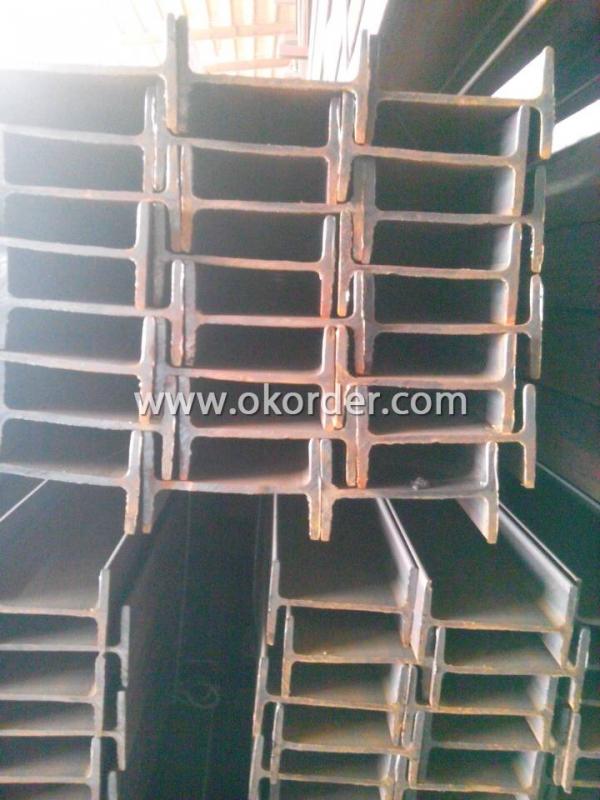
Applications of High Quality Steel I Beam
According to the needs of different structures, steel I beams can compose to different force support component, and also can be the connections between components. They are widely used in various building structures and engineering structures such as roof beams, bridges, transmission towers, hoisting machinery and transport machinery, ships, industrial furnaces, reaction tower, container frame and warehouse etc.
Packaging & Delivery of High Quality Steel I Beam
1. Packing: it is nude packed in bundles by steel wire rod
2. Bundle weight: not more than 3.5MT for bulk vessel; less than 3 MT for container load
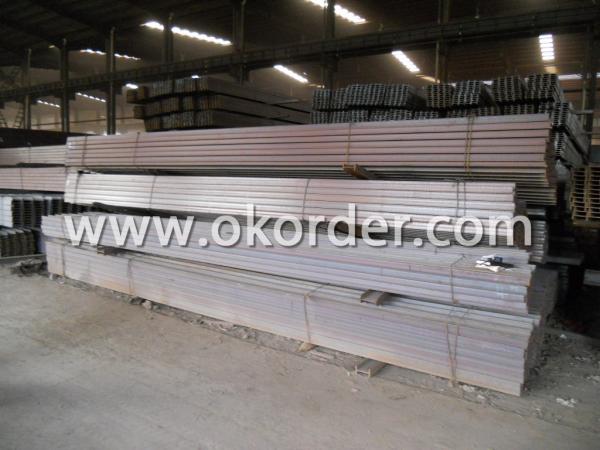
3. Marks:
Color marking: There will be color marking on both end of the bundle for the cargo delivered by bulk vessel. That makes it easily to distinguish at the destination port.
Tag mark: there will be tag mark tied up on the bundles. The information usually including supplier logo and name, product name, made in China, shipping marks and other information request by the customer.
If loading by container the marking is not needed, but we will prepare it as customer request.
4. Transportation: the goods are delivered by truck from mill to loading port, the maximum quantity can be loaded is around 40MTs by each truck. If the order quantity cannot reach the full truck loaded, the transportation cost per ton will be little higher than full load.
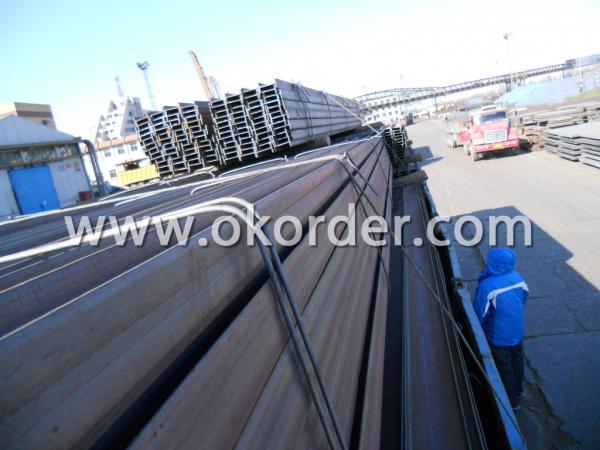
5. Delivered by container or bulk vessel
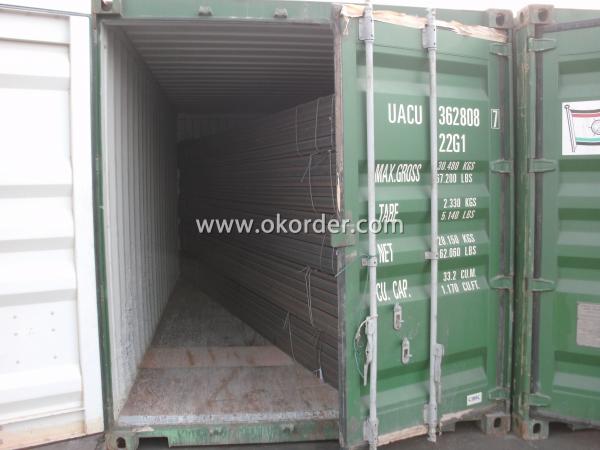
6. Delivery time: All the structural steel I beams will be at the port of the shipment within 45 days after receiving the L/C at sight ot the advance pyment.
7. Payment: L/C at sight; 30% advance payment before production, 70% before shipment by T/T, etc.
Production flow of High Quality Steel I Beam
Material prepare (billet) —heat up—rough rolling—precision rolling—cooling—packing—storage and transportation
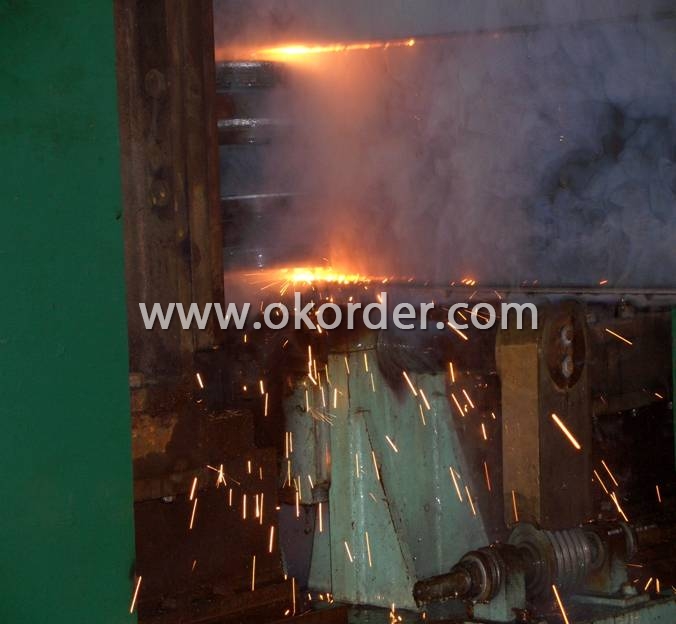
- Q: Can steel I-beams be used in retail or commercial renovation projects?
- Certainly, steel I-beams are suitable for utilization in retail or commercial renovation ventures. Renowned for their robustness and durability, steel I-beams are an ideal choice for supporting hefty loads and ensuring structural stability. In the context of retail or commercial renovation, these steel I-beams can be employed to establish open and flexible floor plans, bolster mezzanine levels, fortify existing structures, or even erect new structures. Moreover, they can be effectively utilized to construct expansive windows or atriums, as they possess exceptional load-bearing capacities. Furthermore, the fire resistance and resilience to pests and decay exhibited by steel I-beams often render them the preferred option in renovation undertakings. All in all, steel I-beams are extensively favored in retail or commercial renovation projects due to their versatility, strength, and ability to endure the rigors of heavy usage.
- Q: How can I spray the fluorocarbon paint on the bottom of I-beam?
- Finally, on fluorocarbon paint, pay attention to fluorocarbon paint without rust prevention ability, only protect primer and base material, acid, alkali, waterproof ability.
- Q: How do steel I-beams perform in terms of snow load resistance?
- Steel I-beams are widely recognized for their exceptional snow load resistance. The structural design of steel I-beams allows them to effectively distribute the weight of snow loads, ensuring optimal support and stability. The shape of the I-beam, with its wide flanges and narrow web, grants it superior strength-to-weight ratio, making it highly efficient in handling heavy loads. Additionally, steel is a strong and durable material that can withstand the pressure and weight of accumulated snow without significant deformation or failure. This makes steel I-beams a reliable choice for structures located in regions with heavy snowfall, as they can effectively bear the weight and maintain structural integrity, ensuring the safety and stability of the building.
- Q: Are there any environmental concerns associated with using steel I-beams?
- Yes, there are environmental concerns associated with using steel I-beams. Steel production involves significant energy consumption and releases greenhouse gases, contributing to climate change. Additionally, the extraction and processing of raw materials for steel production can lead to habitat destruction, deforestation, and water pollution. However, using recycled steel or implementing sustainable manufacturing practices can mitigate some of these concerns.
- Q: How do you calculate the bearing capacity of a steel I-beam?
- To calculate the bearing capacity of a steel I-beam, there are several factors that need to be considered. Firstly, you need to know the dimensions and properties of the I-beam, such as its height, width, and thickness. These measurements are typically provided by the manufacturer or can be obtained through physical measurements. Next, you need to determine the material properties of the steel used in the I-beam. This includes the yield strength, which is the maximum stress the material can withstand without permanent deformation, and the modulus of elasticity, which measures the stiffness of the material. Once you have these measurements and properties, you can use various formulas and calculations to determine the bearing capacity of the I-beam. One commonly used calculation is the Euler's buckling formula, which considers the compressive strength of the I-beam. Another important factor to consider is the load applied to the I-beam. This can include both dead loads, such as the weight of the structure it supports, and live loads, such as the weight of people or machinery. The load distribution and location of the load also play a role in determining the bearing capacity. It is important to note that calculating the bearing capacity of a steel I-beam requires expertise in structural engineering. It is recommended to consult with a professional engineer or use specialized software to accurately determine the bearing capacity and ensure structural safety.
- Q: Can steel I-beams be used for healthcare facilities?
- Yes, steel I-beams can be used for healthcare facilities. Steel I-beams are commonly used in construction for their strength and durability, making them suitable for a variety of applications including healthcare facilities. These beams provide structural support and can be used for framing walls, floors, and roofs, ensuring the stability and integrity of the building. Additionally, steel I-beams are fire-resistant, which is crucial for healthcare facilities where safety is of utmost importance. Furthermore, steel is a sustainable and recyclable material, aligning with the growing green building practices in the healthcare industry. Overall, steel I-beams are a reliable and practical choice for constructing healthcare facilities.
- Q: How do steel I-beams contribute to sustainable building practices?
- Steel I-beams contribute to sustainable building practices in several ways. Firstly, steel is a highly durable and long-lasting material, meaning that steel I-beams provide structural integrity to buildings for many years without requiring frequent replacements. This reduces the overall material consumption and waste associated with construction projects. Secondly, steel is a recyclable material, which means that when a building reaches the end of its life cycle, the steel I-beams can be easily recycled and used in the production of new steel products, reducing the need for virgin materials. Additionally, steel I-beams are versatile and can be easily prefabricated off-site, reducing construction time, minimizing disruption to the surrounding environment, and improving the overall energy efficiency of the building process. Overall, the use of steel I-beams in sustainable building practices helps to reduce the environmental impact of construction, promote resource conservation, and enhance the overall longevity and efficiency of buildings.
- Q: Can steel I-beams be used for overhead garage doors?
- No, steel I-beams cannot be used for overhead garage doors as they are not designed to support the weight and movement of the door. Instead, specialized tracks and torsion springs are used to ensure smooth and safe operation.
- Q: Can steel I-beams be used for mezzanines or elevated platforms?
- Yes, steel I-beams can be used for mezzanines or elevated platforms. They are commonly used in construction for their structural integrity and load-bearing capacity, making them suitable for supporting elevated platforms and mezzanines in various industrial, commercial, and residential applications.
- Q: In steel engineering, what is called rigid connection? What is articulated? What kind of nodes or structural parts are applicable to the two? The more detailed the answer, the better!
- To connect by means of hinges. A device or part commonly used in two parts of a machine, vehicle, door, window, and implement, such as articulated trolley buses, articulated freight cars, articulated buses.
1. Manufacturer Overview
| Location | Qinhuangdao, China |
| Year Established | 2000 |
| Annual Output Value | Above US$ 300 Million |
| Main Markets | Mid East; Africa; Southeast Asia; Brazil |
| Company Certifications | ISO 9001:2008; |
2. Manufacturer Certificates
| a) Certification Name | |
| Range | |
| Reference | |
| Validity Period |
3. Manufacturer Capability
| a) Trade Capacity | |
| Nearest Port | Tianjin; |
| Export Percentage | 70% - 80% |
| No.of Employees in Trade Department | 21-50 People |
| Language Spoken: | English; Chinese; |
| b) Factory Information | |
| Factory Size: | Above 400,000 square meters |
| No. of Production Lines | 2 |
| Contract Manufacturing | OEM Service Offered; |
| Product Price Range | Average |
Send your message to us
High Quality Steel I Beam
- Loading Port:
- Tianjin Port, China
- Payment Terms:
- TT or LC
- Min Order Qty:
- 15MT m.t.
- Supply Capability:
- 10000MT m.t./month
OKorder Service Pledge
OKorder Financial Service
Similar products
Hot products
Hot Searches
Related keywords
